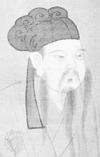- Han Yü
-
/hahn" yyuu"/, (Han Wen-kung, Han Wengong)A.D. 768-824, Chinese writer, poet, and philosopher.
* * *
died 824, Chang'anAn orphan, he joined the Chinese bureaucracy and served in several high government posts. He attacked Daoism and Buddhism, which were then at the height of their influence, and sought to restore Confucianism to its former status. He revived interest in the writings of Mencius and other neglected Confucian classics. His own works were written in a simple prose style unlike the elaborate manner popular at the time, and he became known as the "Prince of Letters." Han Yü, portrait by an unknown artist; in the National Palace Museum, TaipeiBy courtesy of the Collection of the National Palace Museum, Taipei, Taiwan, Republic of China
Han Yü, portrait by an unknown artist; in the National Palace Museum, TaipeiBy courtesy of the Collection of the National Palace Museum, Taipei, Taiwan, Republic of China* * *
▪ Chinese authorborn 768, Heyang [now Mengxian], Henan province, Chinadied 824, Chang'an [now Xi'an], Shaanxi provincemaster of Chinese prose, outstanding poet, and the first proponent of what later came to be known as Neo-Confucianism, which had wide influence in China and Japan.An orphan, Han initially failed his civil service exams because the examiners refused to accept his unconventional prose style, but he eventually entered the bureaucracy and served in several high government posts. At a time when the popularity of Confucian doctrine had greatly declined, Han began a defense of it. He attacked Daoism and Buddhism, which were then at the height of their influence. So outspoken was he that he castigated the emperor for paying respect to the supposed finger bone of the Buddha; this act of criticism almost cost Han his life and caused him to be banished to South China for a year. In defending Confucianism, Han quoted extensively from the Mencius, the Daxue (“Great Learning”), the Zhongyong (“Doctrine of the Mean”), and the Yijing (“Classic of Changes”; known to many as I-Ching), works that hitherto had been somewhat neglected by Confucians. In so doing, he laid the foundations for later Neo-Confucianists who took their basic ideas from these books.Han advocated the adoption of Guwen, the free, simple prose of these early philosophers, a style unencumbered by the mannerisms and elaborate verselike regularity of the pianwen (“parallel prose”) style that was prevalent in Han's time. His own essays (e.g., "On the Way," "On Man," and "On Spirits" ) are among the most beautiful ever written in Chinese, and they became the most famous models of the prose style he espoused. In his poetry also, Han tried to break out of the existing literary forms, but many of his efforts at literary reform failed. He is considered the first of the renowned “Eight Masters of the Tang and Song.” At his death the title of president of the ministry of rites was conferred upon him, as well as the epithet “Master of Letters,” both great honours.Additional ReadingCharles Hartman, Han Yü and the T'ang Search for Unity (1986); Stephen Owen, The Poetry of Meng Chiao and Han Yü (1975).* * *
Universalium. 2010.
